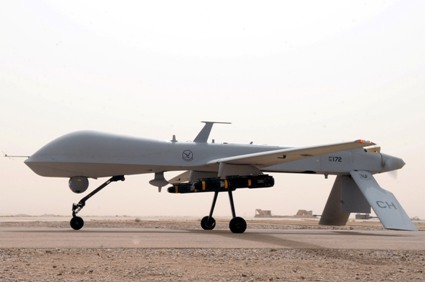What Will the Blowback of Future Military Technologies be for Society?
05/24/2010 -The current pace of technological innovation inside the U.S. military could mean a future in which cyborg insects track the movement of private citizens and humans communicate telepathically, finally putting an end to the belief in real privacy, a scientist hypothesized today.
"Whether you want to have your insects robotic or cyborg, that's up to you," said Braden Allenby, the founding chair of the Consortium on Emerging Technologies, Military Operations, and National Security at Arizona State University. "I'm sure we'll develop both types."
Allenby's gaze into the future of military technology and its domestic implications came as part of a panel for an event called "Warring Futures" put on by the New America Foundation, Slate.com, and Arizona State University. The panel—which also included author Robert Wright, a New America senior fellow, and Daniel Sarewitz, co-director of the Consortium for Science, Policy and Outcomes at Arizona State University—discussed what type of blowback ordinary Americans can expect when science fiction-like military technologies used on the battlefield migrate home in consumer applications or inspire others to bring the war to the United States. (Watch the panel discussion below.)
(For another look at future military technologies, see "Air Force: Drones Will Become More Discriminate Killers.")
Robotic and cyborg insects could have a dramatic impact in counterinsurgency operations.
"It not only gives you better intelligence, but it allows you to reduce collateral damage," Allenby said, noting civilian deaths help terrorists recruit new members. It's also an incredibly powerful surveillance tool because the military can police hostile areas without putting service members in danger.
The technology, however, won't remain on foreign battlefields for long, creating multiple privacy and civil liberties issues for the American public, although Allenby quipped privacy is an antiquated notion that no longer exists.
"Most of you have no privacy," he said. "You think you do, that's probably more dangerous then knowing that you don't. So this may be a benefit."
Throwing out hypotheticals, Allenby sees a future where news organizations could harness the power of robotic insects to track the dealings of politicians they don't like.
Allenby even forecasts a day when humans, with the aid of technology, can communicate telepathically. Militarily this means soldiers that can communicate silently and securely during covert missions and a soldier more and more integrated with weapons technology. But the unintended consequences of such a technology, Allenby said, could eventually mean hackable thoughts and the inability of humans to shield their innermost thoughts from others.
And having the power to read each other's thoughts wouldn't just upset social norms, it could significantly alter human communication away from the spoken and written word. "Again remember this is a hypothetical, but it is not an impossible hypothetical," Allenby said. "It's just going to take us a couple years to get there."
Robert Wright commented that Americans may have already seen blowback from military technology when an alleged homegrown terrorist tried to detonate a car bomb in New York City almost a month ago, noting media reports that Faisal Shahzad's motivation was to avenge drone attacks in Pakistan.
"Is there something about this particular kind of deployment of force—remotely deployed force that poses no risk to us that plays especially well into the narrative of terrorist recruiters?," asked Wright.
Wright noted that drone attacks reinforce Muslim perceptions that the U.S. military "kills people as if they are insects." He also argued the upside of drone attacks may outweigh the downside associated with them.
"Drone attacks may explain both the motivation of the Times Square bomber and why he was so unsuccessful," Wright said. "It may be that they are so disrupted over there in Pakistan that they can't do a good job of orchestrating force."
♦ Photo of Reaper drone byU.S. Air Force/WikiMediaCommons
